Dark pools, also known as private exchanges, are off-exchange trading venues that allow institutional investors to trade large blocks of shares anonymously, without revealing their orders to the public.
This type of trading, known as dark pool trading, allows for a level of secrecy and lack of transparency that is not present in traditional public stock exchanges. The trades that occur in dark pools are not visible to other market participants until after they have occurred, making it difficult for retail investors to compete on a level playing field with institutional investors.
In this blog, we will explore the inner workings of dark pools, their advantages and disadvantages, and the current regulatory environment surrounding them. We will also examine the risks they pose for retail investors and offer solutions. We will explore the truth behind dark pool investing, and how hedge funds & other institutional investors may be using it to their advantage.
Let us start by understanding how dark pools work.

How do Dark Pools Work?
Dark pools work by matching buy and sell orders from institutional investors in a private, off-exchange setting. The orders are matched using a dark index, a proprietary index that is not visible to the public. This index matches buy and sell orders without revealing the identity of the parties involved. It allows institutional investors to trade large blocks of shares without revealing their intent to the public.
Once the trade matches, it is executed on a dark exchange, an off-exchange trading platform unregulated by public securities laws. The trade then reports to the public, but the identities of the parties involved are kept a secret. This allows institutional investors to trade large blocks of shares secretively, and it also allows them to trade at prices that are not available to retail investors.
Now that you understand how dark pools work, let us have a look at what are the current regulations around dark pool trading.
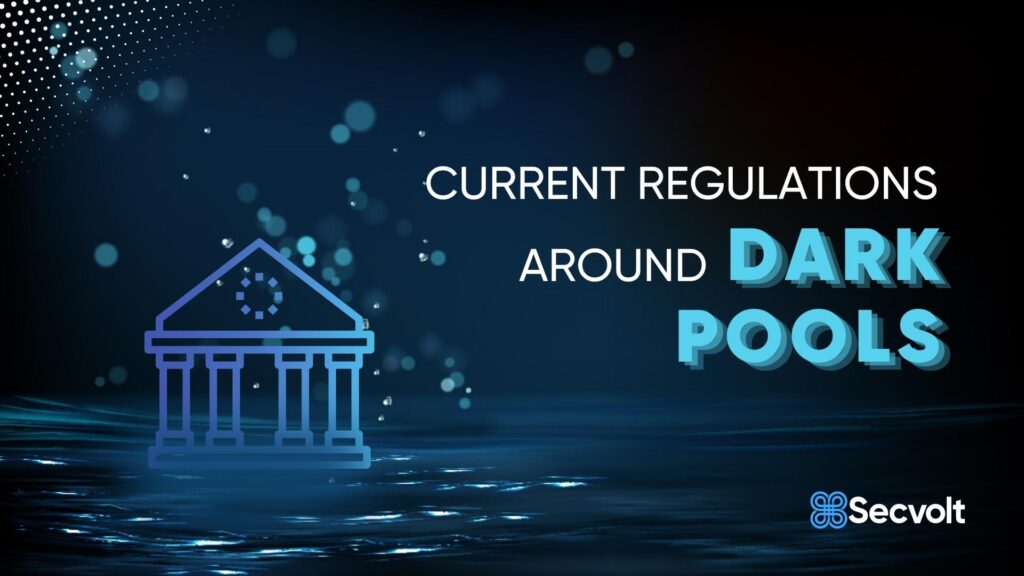
Current Regulations Around Dark Pools
The current regulatory environment surrounding dark pools has been the subject of much scrutiny in recent years. In the wake of the global financial crisis of 2008, regulators have been working to improve transparency and reduce the risk of market manipulation in dark pools.
In the United States, the Securities and Exchange Commission (SEC) has proposed new rules that require dark pools to disclose more information about their operations and the trades that occur within them. These rules make it easier for regulators to monitor illegal activity and make it easier for investors to understand what is happening in the markets.
In Europe, the Markets in Financial Instruments Directive (MiFID II) works to increase transparency and reduce the risk of market manipulation in dark pools.
Overall, the current regulatory environment surrounding dark pools is focused on increasing transparency and reducing the risk of strategized manipulation. Regulators are working to ensure that dark pools are subject to the same rules and oversight as public exchanges to promote fair and efficient markets for all investors.
You have seen the functionality & the current regulatory environment around dark pools, and so far you must have formed an image of dark pools. Well, as every coin has two sides, there’s another side to dark pools too. Thus, next, let us discuss the advantages of dark pool investing.
If you need some ideas about what to read next, here they are:
- 4 Life-Changing Tax Strategies – Secvolt
- Concerns of Being A High-Net-Worth Individual
- How To Profit In An Economic Crisis?

Advantages of Dark Pools
Dark pools offer several advantages for institutional investors. Here are a few key advantages of dark pools trading:
- Anonymity- One of the main advantages of dark pools is that they allow institutional investors to trade large blocks of shares anonymously. This allows them to hide their trading intentions from the public, which can help them avoid market impact and reduce the risk of their trades being picked off by other traders.
- Large Pools of Liquidity- Dark pools offer large pools of liquidity, which makes it easier for institutional investors to trade large blocks of shares without moving the market. This can help them achieve better prices and reduce the costs of trading.
- Reduced Market Impact- By trading in dark pools, institutional investors can avoid the market impact that can occur when they trade large blocks of shares on public exchanges. This can help them achieve better prices and better margins.
- Reduced Volatility- Dark pools can reduce the volatility of stock prices since they provide a way for institutional investors to trade large blocks of shares without the knowledge of the public.
- Reduced Information Leakage- Dark pools can reduce the amount of information leakage that can occur when institutional investors trade large blocks of shares on public exchanges. This can help them avoid having their trades picked off by other traders and can help them achieve better pricing methods.
- Better Prices- In all the above-mentioned points, one advantage that is common amongst all is that dark pools help institutional investors achieve better prices in many ways. Through dark exchange & dark index, investors avail better prices for their trades which is their ultimate goal.
Thus, these are some of the advantages of dark pools that can help investors achieve better returns on their investments and reduce the costs of trading.
Next, let us discuss some disadvantages or risks associated with dark pool trading.
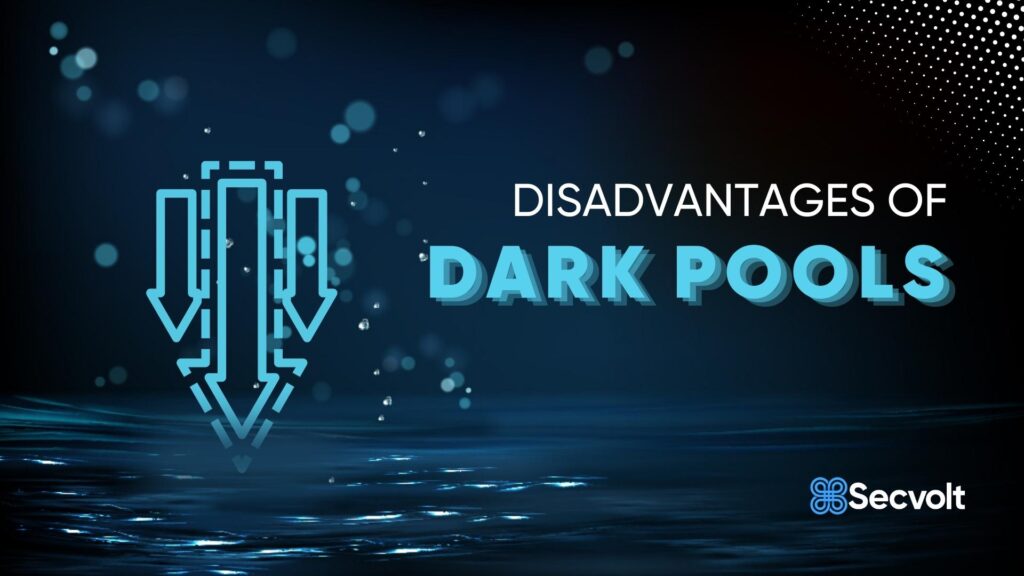
Disadvantages of Dark Pools
The following are a few key disadvantages of dark pool investing:
- Lack of Transparency- One of the main disadvantages of dark pools is that they lack transparency. This can make it difficult for regulators to monitor illegal activity and can make it difficult for investors to understand what is happening in the markets. This same anonymity is an advantage to institutional investors but it is disadvantageous to retail investors.
- Increased Risk of Market Manipulation- Dark pools can increase the risk of market manipulation because they allow traders to hide their trading intentions from the public. This can make it easier for traders to manipulate the markets and can make it more difficult for regulators to detect and prevent this activity.
- Limited Access to Retail Investors- Dark pools are primarily used by institutional investors and are not accessible to retail investors. This can create an uneven playing field and can make it more difficult for retail investors to achieve good prices for their trades.
- Higher Trading Costs- Dark pools can be more expensive to trade in than public exchanges, due to their lack of transparency and their focus on large block trades.
- Reduced Liquidity- Due to the lack of transparency, dark pools may not have as much liquidity as public exchanges, making it more difficult for traders to find counterparties for their trades.
- Reduced Price Discovery- Because dark pools are not visible to the public, they can reduce the ability of the market to discover the true value of a stock. This can make it more difficult for investors to make informed investment decisions.
These disadvantages can make it more difficult for investors to understand what is happening in the markets and make it more difficult for them to achieve good prices for their trades.
Take a look at the infamous Barclays Dark Pool Scandal and High-Frequency Trading next & see how market manipulation happened in real-time.
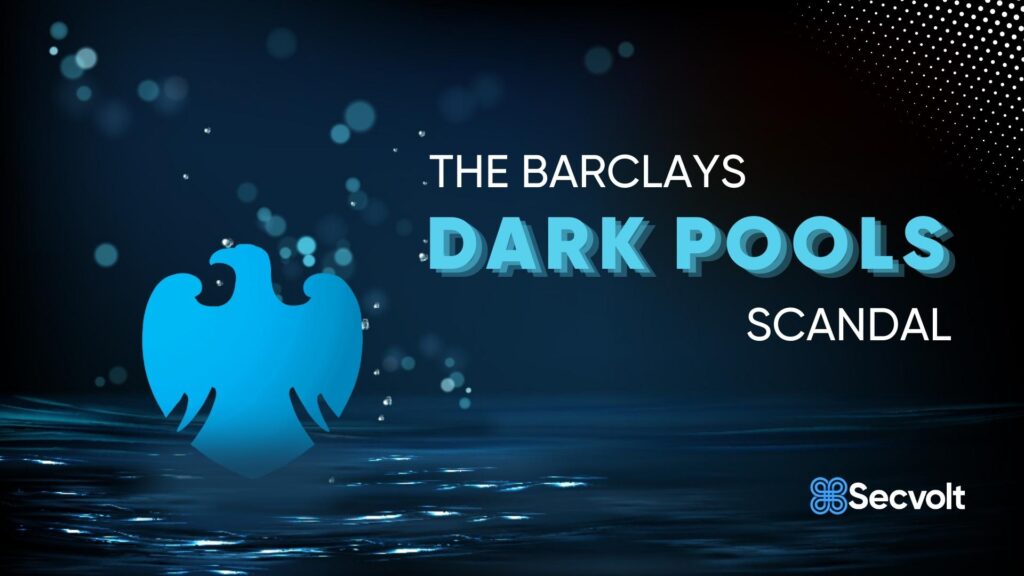
The Barclays Dark Pool Scandal
In 2014, the New York attorney general’s office accused Barclays, a global investment bank, of falsely marketing its dark pool as a safe place to trade securities when, in fact, it was filled with predatory high-frequency traders. The bank was charged with fraud and illegal business practices.
Barclays admitted to misleading investors about the level of high-frequency trading activity in its dark pool and agreed to pay $70 million to settle the charges. The bank also agreed to overhaul its dark pool’s operations, install new technology and hire an independent consultant to review its practices.
The case highlighted several key issues with dark pools.
Barclays’ dark pool, named “Barclays LX”, was marketed as a safe haven for investors to execute large block trades anonymously, however, it was being used by high-frequency traders to gain an unfair advantage over others in the pool. This resulted in retail investors not getting the best prices for their trades and even, in some losing money.
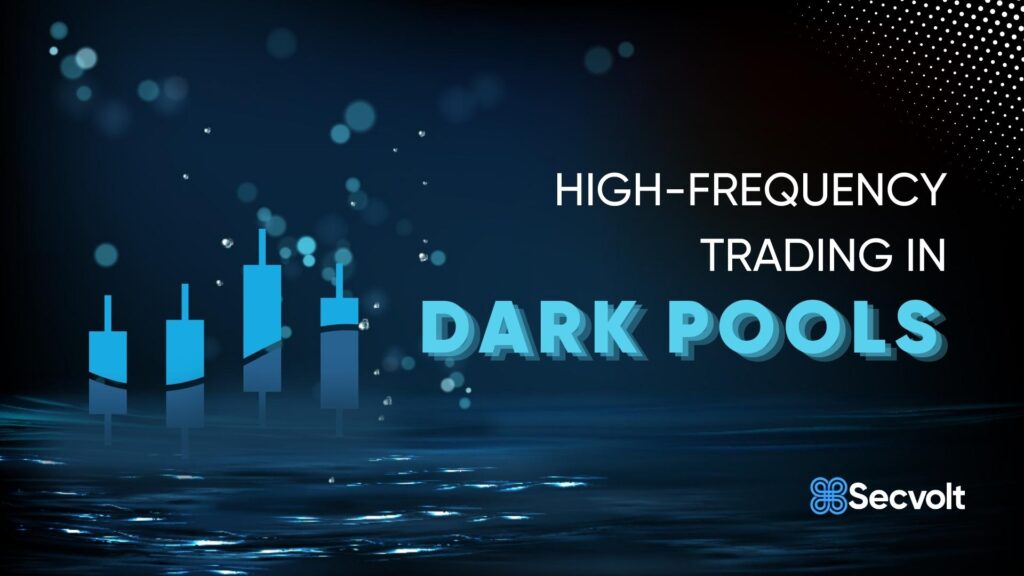
High-Frequency Trading in Dark Pools
Another example of dark pools being used to gain an advantage over retail investors is the case of high-frequency trading in dark pools. High-frequency traders use powerful computers and sophisticated algorithms to execute trades at lightning speed. They can execute trades in milliseconds, ahead of other traders, and can gain an advantage by having access to better prices, and faster execution. This can be done by exploiting the lack of transparency in dark pools.
In conclusion, dark pools have been used by hedge funds and other institutional investors to gain an advantage over retail investors. The lack of transparency in these dark pools can make it difficult for retail investors to understand what is happening in the markets and can make it more difficult for them to achieve good prices for their trades. Real-life cases such as the Barclays Dark Pool Scandal and High-Frequency Trading in Dark Pools have brought these issues to light and have led to calls for stricter regulations to ensure fair markets for all investors.
So, if these are the risks associated with dark pool trading, what are the solutions then? Have a look at those in the next paragraph.
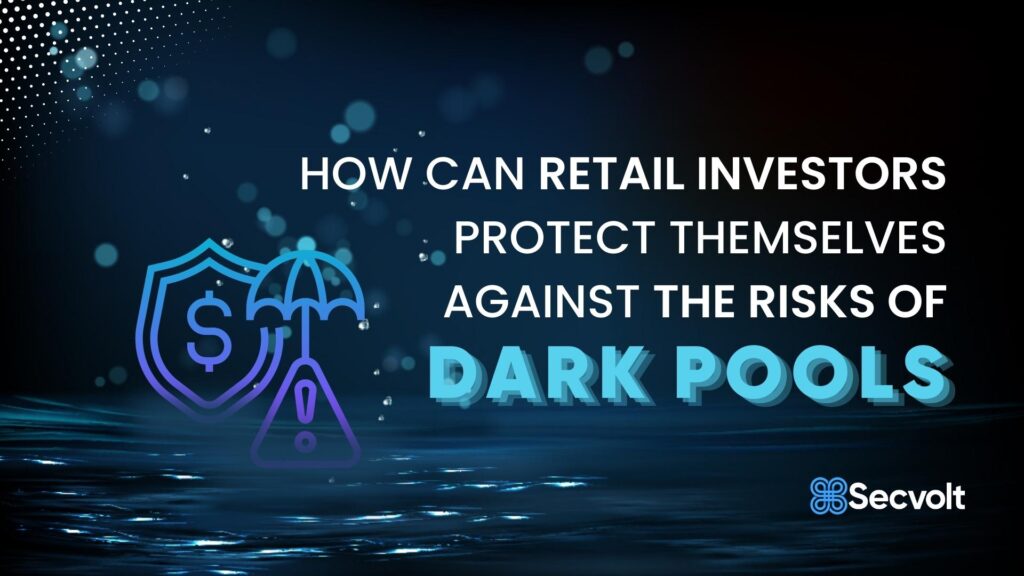
How Can Retail Investors Protect Themselves Against the Risks of Dark Pools?
The following are some solutions that can help retail investors prepare against the potential risks of dark pool trading:
- Using Limit Orders- One practical solution for retail investors to protect themselves from the potential risks of dark pools is by using limit orders. A limit order is an order to buy or sell a security at a specific price or better. This means that the investor sets a specific price at which they are willing to buy or sell a stock. By using limit orders, investors can ensure that they are getting the best price for their trades, rather than being at the mercy of dark pool operators who may be manipulating prices.
- Avoiding Anonymous Trading Platforms- Retail investors should also avoid anonymous trading platforms which have minimal regulatory oversight. This can be done by researching and identifying the dark pools and their operators before investing. By investing in regulated dark pools with a good reputation, investors can reduce the risk of getting caught in a scam.
- Using Regulated Exchanges- Another solution for retail investors is to use regulated exchanges, where the trading process is transparent and prices are fair. The Securities and Exchange Commission (SEC) oversees the operations of these exchanges to ensure that they are operating in compliance with regulations.
- Seeking Advice from Financial Advisors- Another practical solution for retail investors to protect themselves from the potential risks of dark pools is by seeking advice from financial advisors. Financial advisors can help investors understand the risks and benefits of dark pools and can guide how to navigate these markets. They can also help investors understand how to use limit orders and other tools to protect themselves from the risks of dark pools.
- Staying Informed- Finally, retail investors should stay informed about recent developments and changes in the dark pool regulations and market conditions. By staying informed, investors can make better-informed decisions and can take steps to protect themselves from the potential risks of dark pools.
By following these tips, retail investors can protect themselves against the risks presented by dark pool trading.
In the final section, you will find a hedge fund that has been able to wave through the path of dark pool investing amazingly & that generated record-breaking 262% returns for its clients last year.
The Bottom Line
This blog has explored the topic of dark pools, which are private financial exchanges where institutional investors, such as hedge funds, can trade large blocks of shares anonymously. While dark pools have some advantages, such as providing liquidity and reducing market impact, they also have potential risks such as market manipulation. The current regulatory environment surrounding dark pools is constantly evolving and retail investors need to stay informed and use practical solutions such as limit orders and seeking advice from financial advisors to protect themselves.
One such hedge fund that has been able to overcome the disadvantages and shortcomings of dark pool investing with great success is Secvolt. Secvolt provides a clear picture throughout the process and complete access to every stakeholder. When it comes to price discovery and liquidity, Secvolt doesn’t put a boundary on these too so that the clients have everything at their convenience. It has a reputation for its expertise in investing and has been able to generate exceptional 262% returns for its investors. In addition to its short-term trading strategy, Secvolt also prioritizes transparency and compliance with regulations. Overall, Secvolt is a great example of a hedge fund that has been able to utilize the benefits of dark pools while minimizing the potential risks. Retail investors can consider looking into hedge funds like Secvolt for guidance and protection in the dark pool trading market.
Join Our Newsletter
Elevate your financial game & join the ranks of elite investors with Secvolt’s exclusive newsletter.
Join Our Newsletter
Elevate your financial game & join the ranks of elite investors with Secvolt’s exclusive newsletter.
Don’t just dream of wealth; achieve it with Secvolt. Schedule a call today for personalized guidance on your investment strategy and join the ultra-successful.
Ready to unlock your wealth’s truest potential & cherish affluence?
Secvolt, our hedge fund, sets the bar high with a record-breaking performance of 262% returns in 2022. With the brilliance of our highly advanced quant models and the efficiency of our risk mitigation protocols, we are yet to see a loss!
We’re the perfect ally to help you succeed financially and build the lasting legacy you have always aspired for.
Get in touch today. YOUR LEGACY AWAITS YOU…






